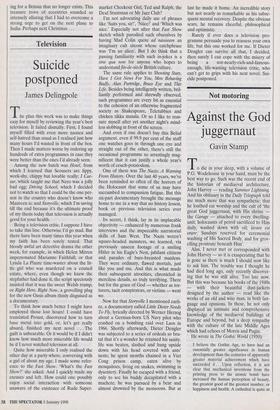Television
Suicide postponed
James Delingpole
The plan this week was to make things easy for myself by reviewing the year's best television. It failed dismally. First, I found myself filled with even more nausea and self-hatred than usual as I realised just how many hours I'd wasted in front of the box. Then I made matters worse by ordering up hundreds of extra programmes in case they were better than the ones I'd already seen.
Among the new batch was Hotel, from which I learned that Scousers are lippy, work-shy, chippy but lovable really; I Cae- sar, which taught me that Nero was a jolly bad egg; Driving School, which I decided not to watch so that I could be the one per- son in the country who doesn't know who Maureen is; and Stotyville, which I'm saving till the end because it's the ultimate proof of my thesis today that television is actually good for your health.
Being a television critic, I suppose I have to take this line. Otherwise I'd go mad. But there have been many times this year when my faith has been sorely tested. That bloody awful art detective drama the other week, for example, in which Helen Mirren impersonated Marianne Faithfull; or that Lynda La Plante time-waster about the lit- tle girl who was murdered on a council estate, where, even though we knew the stepfather had done it, the script speciously insisted that it was the sweet Welsh tramp; or Right Here, Right Now, a grovelling plug for the new Oasis album thinly disguised as a documentary.
To think how much better I might have employed those lost hours! I could have translated Proust, discovered how to turn base metal into gold, or, let's get really absurd, finished my next novel . . . The guilt is unbearable. Or it would be if I didn't know how much more miserable life would be if I never watched television at all.
Quite how miserable I only realised the other day at a party where, conversing with a girl of about my age, I made some refer- ence to the Fast Show. 'What's the Fast Show?' she asked. And I quickly made my excuses and left. How could one possibly enjoy social interaction with someone unaware of the existence of Rude Super- market Checkout Girl, Ted and Ralph, the Deaf Stuntman or Mr Jazz Club?
I'm not advocating daily use of phrases like 'Suits you, sir!', `Niice!' and 'Which was nice.' Especially not after that Fast Show sketch which parodied such obsessives by having Mad Colin quote ad nauseam an imaginary cult sitcom whose catchphrase was 'I'm an alien'. But I do think that a passing familiarity with such in-jokes is a sine qua non for anyone who hopes to understand fin-de-siecle British culture.
The same rule applies to Shooting Stars, Have I Got News For You, Men Behaving Badly, Alan Partridge, Brass Eye and This Life. Besides being intelligently written, bril- liantly performed and shrewdly observed, such programmes are every bit as essential to the cohesion of an otherwise fragmented society as Shakespeare, Teletubbies and chicken tikka masala. Or so I like to reas- sure myself after yet another night's mind- less slobbing in front of the screen.
And even if one doesn't buy this Belial argument, even if 99.9 per cent of the stuff one watches goes in through one eye and straight out of the other, there's still the occasional programme so arrestingly mag- nificent that it can justify a whole year's worth of couch-potatodom.
One of these was The Nazis: A Warning From History. Over the last 40 years, we've been reminded so often of the horrors of the Holocaust that some of us may have succumbed to compassion fatigue. But this six-part documentary brought the message home to me in a way that no history lesson, book or previous television series ever managed.
Its secret, I think, lay in its implacable objectivity — enhanced by numerous frank interviews and the impeccable narratorial skills of Sam West. The Nazis weren't square-headed monsters, we learned, via previously unseen footage of a smiling Hitler in his Eagle's Nest, jubilant citizens and parades of bare-breasted maidens. They were ordinary, flawed mortals, just like you and me. And this is what made their subsequent atrocities, chronicled in merciless details, so truly terrifying. There but for the grace of God — whether as tor- turers, tacit conspirators, or victims — went we.
Now for that Stotyville I mentioned earli- er, a documentary called Little Dieter Needs To Fly, lyrically directed by Werner Herzog about a German-born US Navy pilot who crashed on a bombing raid over Laos in 1966. Shortly afterwards, Dieter Dengler was subjected to a series of ordeals so bru- tal that it's a wonder he retained his sanity. He was beaten, slashed and hung upside down with his head covered with ants' nests; he spent months chained in a Viet Cong prison camp, eaten alive by mosquitoes, living on snakes, swimming in dysentery. Finally he escaped with a friend, only to see his buddy decapitated with a machete; he was pursued by a bear and almost drowned by the monsoons. But at last he made it home. An incredible story but not nearly as remarkable as his subse- quent mental recovery. Despite the obvious scars, he remains cheerful, philosophical and optimistic.
Rarely if ever does a television pro- gramme persuade you to reassess your own life, but this one worked for me. If Dieter Dengler can survive all that, I decided, then surely I can cope with the misery of being a not-nearly-rich-and-famous- enough, life-wasting television critic, who can't get to grips with his next novel. Sui- cide postponed.


















































 Previous page
Previous page